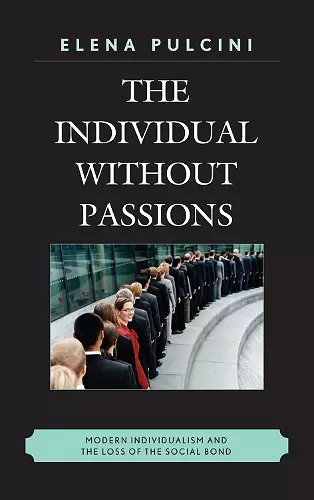The Individual without Passions
Modern Individualism and the Loss of the Social Bond
Elena Pulcini author Karen Whittle translator
Format:Hardback
Publisher:Lexington Books
Published:9th Aug '12
Currently unavailable, and unfortunately no date known when it will be back

The innovative characteristic of the book lies in its tackling an extremely timely and important issue—mainly individualism—from the original point of view of a theory of passions. It underlines the importance of the problem of the passions both in forming individual identity and in building the social bond. Drawing inspiration from classic authors who represent fundamental milestones along the route of modern individualism (from Montaigne to Hobbes, from Locke to Smith, from Rousseau to Tocqueville etc.), it puts forward new hypotheses that contrast with the consolidated views of contemporary reflection, both modern and postmodern. The main argument is that passions are crucial not only when they are strong (homo oeconomicus), but also when absent or weak (homo democraticus), in both cases producing pathological effects on the Self and the social bond. Finally, the book underlines, in a normative perspective, that the image of the modern individual does not end with the egoistical passions and that it is possible to reactivate empathetic and solidaristic passions; furthermore, it proposes the hypothesis that the (solidaristic) passions go to fight the (egoistical) passions. This is most evident in the phenomenon of the gift (as interpreted by Marcel Mauss and his contemporary heirs), the “hidden” testimony of a desire for belonging that enables one to think of a new figure of the individual: homo reciprocus.
In The Individual without Passions, Elena Pulcini brilliantly deconstructs the presuppositions behind our possessive, narcissistic, and frequently male individualism. Above all she suggests that we should reexamine the bonds between individual and community through a new approach to democracy that revives the requirement for equality based on the gift relationship. With this book Elena Pulcini brings a major contribution to this debate that has the potential to renew political thought. -- Marcel Hénaff, University of California, San Diego
While complying scrupulously to the ordinary demands of criticism and exegesis of philosophical texts, Elena Pulcini has always taken care, in her studies relevant to the history of ideas, to focus on the particular historicity of the discursive sets examined--that is to say, on the fact of their intelligibility is conditioned on a certain type of correlation between the concepts developed by the philosophers and the way the world works--that they express in their manner while influencing the course. The project brought by Elena Pulcini strikes immediately with its ambition. The work of Elena Pulcini has finally donned a remarkable breadth and an undeniable originality that resembles, that of Martha Nussbaum, or that of Axel Honneth and Daniel Innerarity, with whom she also engages in explicit conversation * nonfiction.fr *
ISBN: 9780739166574
Dimensions: 234mm x 157mm x 23mm
Weight: 499g
224 pages